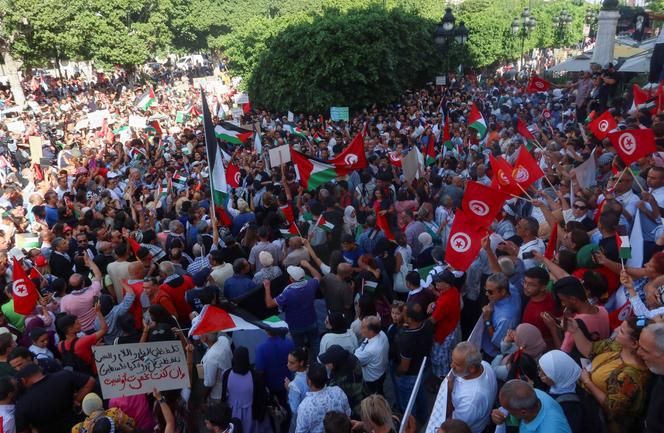


In Al-Hammah, in southern Tunisia, the tomb of 16th-century Rabbi Yosef Ma'aravi, usually only sees a few hundred faithful members of the Jewish community and pilgrims from across the country who come to honor his resting place. On the night of October 17-18, a few hours after the news of the explosion at Al-Ahli hospital in Gaza, for which Hamas pointed the finger at an Israeli missile, and as protests erupted in many Tunisian towns, hundreds of young people stormed the synagogue and the shrine it houses. They vandalized it while shouting their support for Palestine and eventually hoisted the Palestinian flag on the roof of the synagogue as a symbol of victory.
The building was set on fire, and graffiti was daubed on the walls, which were severely damaged during the night. "They went there with hammers, burnt the place down, and smashed everything up," said Ariel, who prefers to use an assumed name for fear of reprisals. Apart from the annual Hanukkah pilgrimage in December, the tomb, which is over 400 kilometers south of Tunis, sees very few visitors. However, news of its desecration has shocked the Tunisian Jewish community and confirmed fears that Tunisia's historic pro-Palestinian stance often manifests into anti-Semitism.
As of Sunday, there had still been no reaction from the authorities to the fire at the Al-Hammah tomb. On May 9, after a terrorist attack on the Jewish pilgrimage of La Ghriba, which left five dead including two pilgrims, Tunisian President Kais Saied was quick to criticize the international response declaring the attack to be anti-Semitic saying that "Palestinians are killed every day and [that] nobody talks about it."
In this context, the events at Al-Hammah trigger painful memories within the local Jewish community reminding them of a history of violence as the situation in the Middle East evolves. "There's an air of 1967 about it, and it's frightening," said Nino, a native of Djerba who also used an assumed name. On June 5, 1967, at the start of the Six-Day War, a demonstration in Tunis outside the American Cultural Center spiraled into a riot. Jewish-owned stores were ransacked, and Tunis' main synagogue was set on fire. Nino hadn't even been born, but the trauma has been passed down from generation to generation.
"It's the same old thing. Israel goes and attacks Gaza leaving Jews around the world to suffer the consequences," he said. "Unfortunately, in Tunisia, people don't distinguish between Israelis and Jews." A confusion perpetuated by "a long-standing tradition of anti-Judaism," said Sophie Bessis, a Franco-Tunisian historian. "In education, in teaching, Jewish Tunisians don't exist. School textbooks don't mention the country's 1000-year-old Jewish presence. Children are not educated about any diversity in Tunisia, which, by the way, doesn't just mean Jews," she said. In less than a century, Tunisia's Jewish community has shrunk drastically, from over 100,000 members to around 1,500 today.
Those who have resisted the urge to move to Europe or America, and the calls for Aliyah – emigration to Israel encouraged by the Hebrew state – are plunged into a state of anxiety as the crises in the Middle East unfold. "We keep a low profile, we don't post anything on social media and if there's a demonstration, we stay off the streets," said Nino, who has no plans to leave for the time being, but doesn't hide the fact that others might choose differently.
"How can we not be worried?" asked Ariel, who believes that social media is playing a major role in the spread of anti-Semitism. "People are openly and unashamedly anti-Semitic," he said, referring to the many comments welcoming the damage caused to Al-Hammah or calling for similar acts. "Bravo," "An eye for an eye, a tooth for a tooth," "The sequel to [the synagogue at] la Ghriba," are just some of the comments seen on social media. Jews are also regularly referred to their links, real or supposed, with Israel and asked to take a stand," said Ariel. "It's quite simple. If you don't give your official position, and you keep quiet, then you're condoning it," he said, before concluding, fatalistically: "Today, all it takes is for some idiot to post a message calling for a synagogue to be attacked, and you get someone who actually answers that call."
Translation of an original article published in French on lemonde.fr; the publisher may only be liable for the French version.
